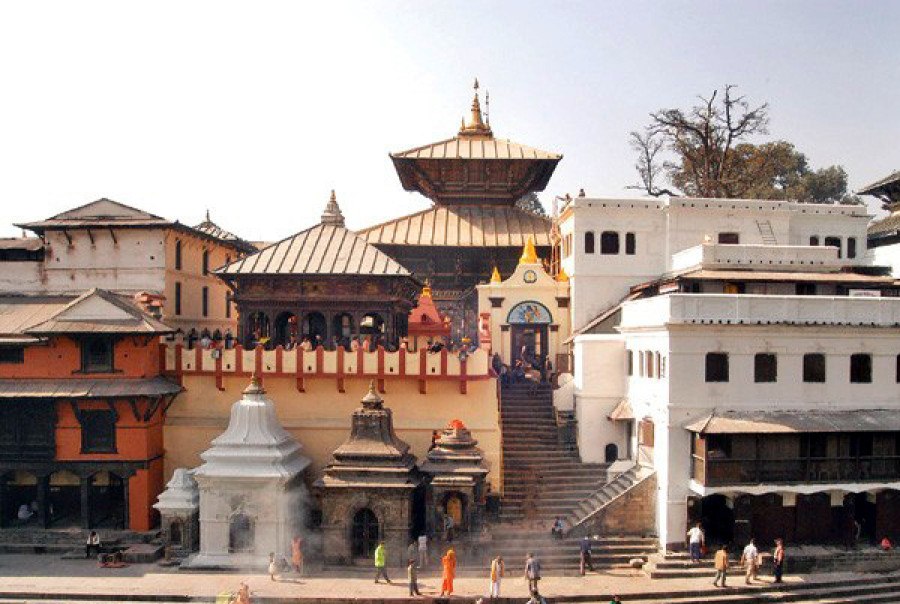Kathmandu
Pashupatinath area--declared a ‘beggar-free zone’ only a year ago--sees almost double the number of beggars this year
The World Heritage Site is filled with beggars who fled the Manab Sewa Ashram in Samakushi complaining of mistreatment and prison-like conditions
Anup Ojha
It’s scorching hot and Kanchi Tamang, who lost all her fingers to leprosy, sits in the shade of the gate at the entrance of the main temple of Pashupatinath—begging for alms from passers-by. With her are two other women beggars, one deaf and the other dumb.
Sixty-six-year-old Tamang and her two companions—until recently—used to live in the Samakhushi-based Manab Sewa Ashram. The ashram was established by the Pashupati Area Development Trust in coordination with the Ministry of Culture Tourism and Civil Aviation as a shelter for beggars living around the Pashupatinath area.
Around 180 beggars were moved to the ashram in April last year, and then the area was announced as 'beggar-free zone’. The task was highly appreciated, even by the late Rabindra Adhikari, minister for Culture Tourism and Civil Aviation, who had then requested the trust to ‘give them livelihood skills.’
Today, just a little over a year after the announcement was first made, the area is filled by over six dozen beggars, most of whom are escapees from the ashram. When the Post visited the area on Tuesday, there were beggars sitting in groups in Dakshin Murti Road, Bankali, Crematorium and Bhubeneshwor Chowk areas and many of them were reluctant to talk about the place they had come from. Most, however, said that when the police came chasing they all scattered to avoid confrontation. Upon being asked as to why they left the ashram in the first place, some unanimously said “because of poor management and rude behaviours”.
Kedar Man Bhandari, chairperson of Pashupatinath Sewak Saang, established the fact that the number of beggars have doubled in the Pashupatinath premises compared to last year. “In the daytime police chase them. But in the mornings and evenings, they all come back. The crowd of beggars is bigger than last year,” said Bhandari. “The trust might have received some aid money to spend and now that they have shown their spending by taking in beggars from this area last year, they are gradually leaving the beggars on the road.”
Tamang, who was among the few people willing to speak about the beggars’ plight at the ashram, said that the initial days at the shelter were good but soon the quality of food and the management of the place became progressively worse. “I later began to realise that the ashram was like a prison. The food they gave us was almost inedible,” said Tamang, who stayed at the ashram for five months. “When I told them that I didn’t want to stay at the ashram anymore, they beat me up. This happened several times during my five-month stay,” said Tamang, recalling her bad days at the ashram.
Govinda Tandon, chief patron of the Samaj and also the former Member Secretary at the Trust, said that the number of beggars in the Pashupatinath area was increasing, but he denied the accusations of the beggars about mismanagement and rude behaviour on the part of the ashram employees. “We let go of a few of the beggars who said they wanted to go home, but we have come to realise that most of them left the ashram and resettled in the Pashupatinath area,” said Tandon. He believes that the beggars don’t want to stay at the ashram because there’s no freedom of drinking alcohol unlike out in the open roads.
Sexagenarian Tamang said that after repeated complaints, one of the members of the ashram left her at Kapan. “I had to walk all the way from Kapan to here,” she said, “my two companions also fled from the ashram.”
Tamang had initially started to live in the Pashupatinath premise after her house in Trishuli turned to rubble on April 25, 2015. She now stays with a friend in a rented room near Jaya Bageshwori. Tamang comes out begging for alms during the mornings and evenings.
Ratna Bahadur Gurung who has been riding a free electric auto-rickshaw service for elderly people and disabled from the Bankali area to the entrance gate of the main temple for the past one year said that the number of beggars has been rapidly increasing in the Pashupati premises. “Most of these beggars have fled from the ashram. In the mornings, the road that leads to the main temple is filled with beggars,” said Gurung, who starts his duty at 7am.
The Post tried to reach Pradeep Dhakal, a member secretary of the trust, on his number but it was continuously unavailable.




 19.12°C Kathmandu
19.12°C Kathmandu.jpg)











